Hyundai Santa Fe: Lubrication System / Engine Oil. Repair procedures
| Oil and filter replacement |
| •
|
Be careful not to damage the parts located under the vehicle
(floor under cover, fuel filter, fuel tank and canister) when
raising the vehicle using the lift.
(Refer to General Information - "Lift and Support Points")
|
|
| •
|
Prolonged and repeated contact with mineral oil will result
in the removal of natural fats from the skin, leading to dryness,
irritation and dermatitis. In addition, used engine oil contains
potentially harmful contaminants which may cause skin cancer.
|
| •
|
Exercise caution in order to minimize the length and frequency
of contact of your skin to used oil. Wear protective clothing
and gloves. Wash your skin thoroughly with soap and water, or
use water-less hand cleaner, to remove any used engine oil.
Do not use gasoline, thinners, or solvents.
|
| •
|
In order to preserve the environment, used oil and used oil
filter must be disposed of only at designated disposal sites.
|
|
|
1. |
Drain the engine oil.
|
(1) |
Remove the oil filler cap (A).
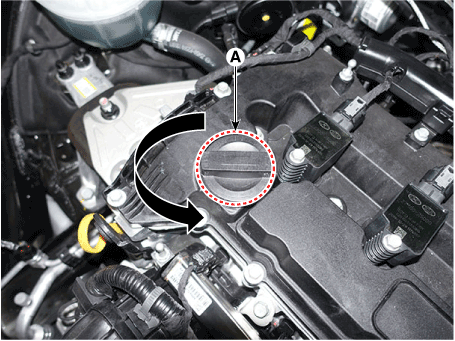
|
|
(2) |
Remove the oil drain survice cover (A).
|
Tightening torque :
7.8 - 11.8 Nm (0.8 - 1.2 kgf.m, 5.8 - 8.7 lb-ft)
|
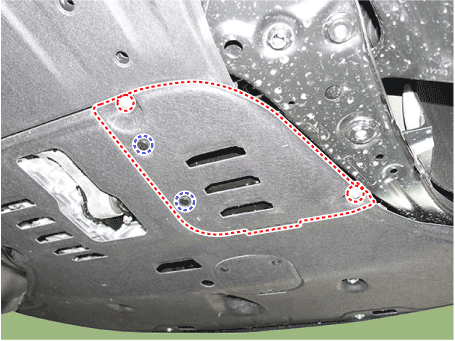
|
|
(3) |
Remove the oil drain plug (A) and drain the oil into a container.

|
|
|
2. |
Replace the oil filter.
|
(1) |
Remove the oil filter survice cover (A).
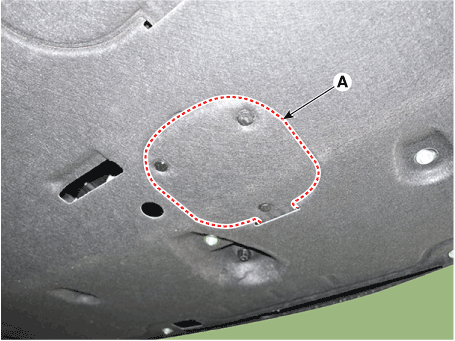
|
|
(2) |
Remove the drain bolt (A) on the bottom of the oil filter cap
and drain the oil in the oil filter.
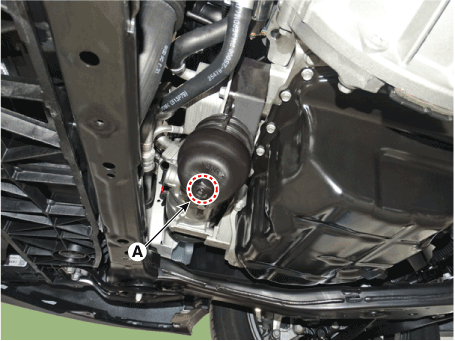
|
|
(3) |
Remove the oil filter cap (A).
|
|
(4) |
Install the new oil filter element (C).
Lightly screw the oil filter cap into place, and tighten it
until the O-ring (B) contacts the seat. Finally tighten it again
by specified tightening torque.
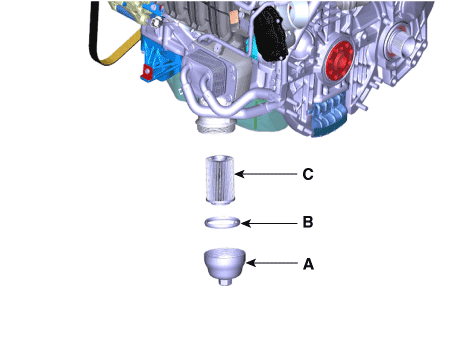
|
• |
Make sure to drain the engine oil first before
replacing the oil filter. If not, the oil may
spill on the oil pan assembly side when removing
the oil filter and may be mistaken for leakage.
|
|
• |
Wipe off the oil and foreign substances remaining
inside the filter housing, threads and cover
cap threads as much as possible.
※ If the residual oil is not removed, it may
leak between the cover cap and the housing mating
surfaces, which can be mistaken for oil leakage.
(The amount of leaking oil and the leaking period
may differ depending on the amount of residual
oil)
|
|
• |
When assembling the gasket, pay attention to
the protrusion direction (A).
If assembled in reverse, gasket lifting and
leakage may occur.
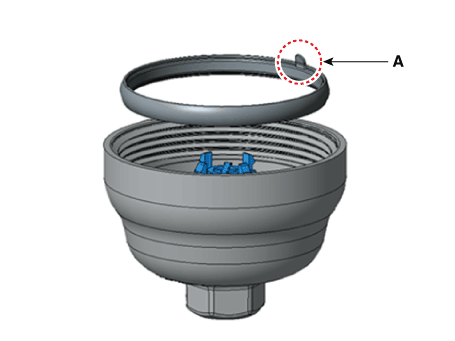
|
|
• |
After assembling the gasket to the cover cap
groove, make sure to press it in the whole circumferential
direction (360°) with fingers so that the entire
gasket is seated sufficiently.
※ If the gasket is seated incompletely, leakage
may occur.
|
|
• |
Remove the foreign substances on the gasket
seating surface and inside the cover cap/housing
mounting areas.
|
|
• |
Apply minimum amount of oil to the new gasket
surface to prevent possible gasket damage.
|
|
|
|
(5) |
Replace the O-ring (B) of the drain bolt with a new one. Tighten
the drain bolt (A) by specified tightening torque.
|
Tightening torque :
4.0 - 5.0 N.m (0.41 - 0.51 kgf.m, 0.90 - 1.12 lb-ft)
|
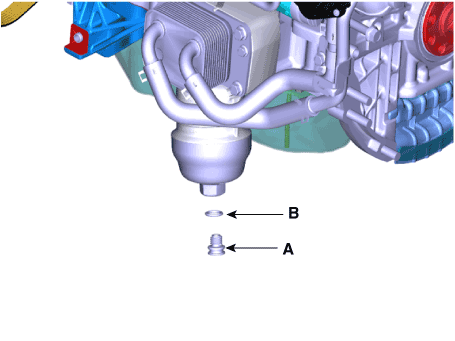
|
• |
Assemble the drain plug to the specified torque
using a torque wrench.
※ When manually assembling the drain plug using
a hexagonal wrench, it may result in the damage
to the drain plug or leakage due to the failure
to comply with the specified torque.
|
|
|
|
|
3. |
Refill with the engine oil.
|
(1) |
Clean and install the oil drain plug (A) with a new gasket (B).
|
Tightening torque :
34.3 - 44.1 N.m (3.5 - 4.5 kgf.m, 25.3 - 32.5 lb-ft)
|
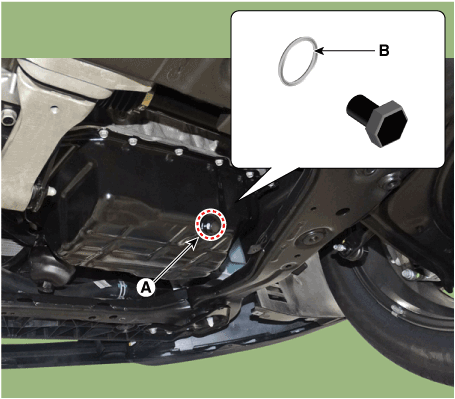
|
|
(2) |
Fill with fresh engine oil after removing the engine oil level
gauge.
|
Capacity
Total :
6.8 L (1.80 U.S.gal., 7.19 U.S.qt., 5.98 lmp.qt.)
Oil pan :
5.5 L (1.45 U.S.gal., 5.81 U.S.qt., 4.84 lmp.qt.)
Drain and refill including oil filter and oil cooler
:
5.8 L (1.53 U.S.gal., 6.13 U.S.qt., 5.10 lmp.qt.)
|
|
|
(3) |
Install the oil filler cap (A) and oil level gauge.
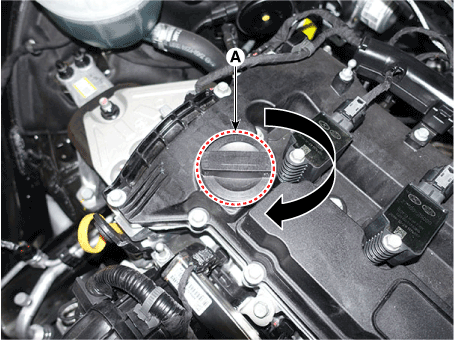
|
|
|
4. |
Start engine and check for oil leaks.
|
|
5. |
Recheck the engine oil level.
|
|
1. |
Check the engine oil quality.
Check the oil deterioration, entry of water, discoloring of thinning.
If the quality is visibly poor, replace the oil.
|
|
2. |
Check the engine oil level.
After engine warm up stop the engine wait 15 minutes then check the
oil level. Oil level should be between the "L" and "F" marks on the
dipstick. If low check for leakage and add oil up to the "F" mark.
|
Do not fill with engine oil above the "F" mark.
|
|
Selection Of Engine Oil
Recommendation :
| – |
Middle East : 5W-30 ACEA A5/B5 or 0W-30 ACE C2
|
| – |
EUROPE : 0W-20 API LATEST(SN PLUS) or ACEA C5
|
Classification :
SAE viscosity grade : Refer to the recommended SAE viscosity number
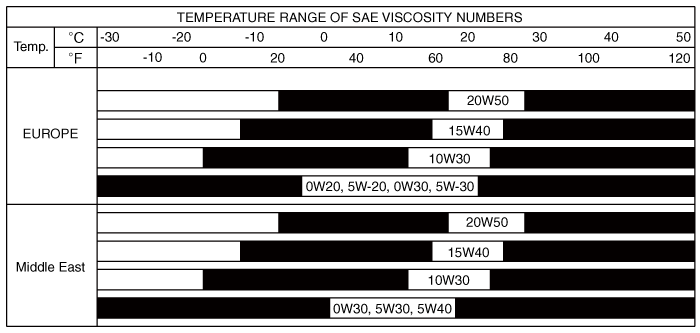
|
For best performance and maximum protection of all types of operation,
select only those lubricants which :
| 1) |
Satisfy the requirement of the API, ILSAC or ACEA classification.
|
| 2) |
Have proper SAE grade number for expected ambient temperature
range.
|
| 3) |
Lubricants that do not have both an SAE grade number and API,
ILSAC or ACEA service classification on the container should
not be used.
|
|
Removal
•
Be careful not to damage the parts located under the vehicle
(floor under cover, fuel filter, fuel tank and canister) when
raising the vehicle using the lift...
Other information:
To unlock and open the liftgate manually from inside the luggage compartment,
perform the following procedure:
1. Insert a long, flat object, such as a key into the opening at the bottom of
the liftgate.
2. Slide the latch in the direction of the arrow to unlock the liftgate...
Removal
•
When removing with a flat-tip screwdriver or remover, wrap protective
tape around the tools to prevent damage to components...
Categories
Speedometer
.png)
The speedometer indicates the speed of the vehicle and is calibrated in miles
per hour (MPH) and/or kilometers per hour (km/h).
Tachometer
.png)
read more

 Balance Shaft Module. Repair procedures
Balance Shaft Module. Repair procedures.png)
.png)













